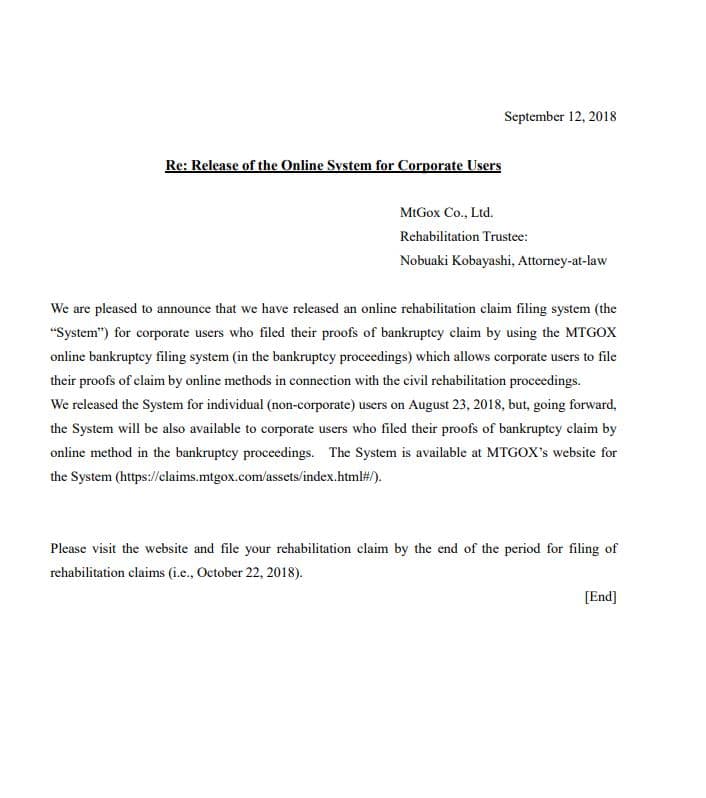Over one billion dollars worth of Bitcoin , out of circulation since 2014, could soon be re-absorbed into the market as disgraced cryptocurrency exchange Mt. Gox enters the second stage of rehabilitation proceedings to pay back its creditors.
Mt Gox, once the world's foremost Bitcoin exchange, last week announced that it released an "online rehabilitation claim filing system ... for corporate users who filed their proofs of bankruptcy claim by using the MTGOX online bankruptcy filing system."
Users who filed a valid bankruptcy claim now have until the 22nd of October 2018 to file a claim for compensation of losses incurred in the infamous 2014 hack on the exchange.
The release of the claim filing system for corporate users follows the release of the system for individual users in August.
In June 2018, the bankruptcy of Mt Gox was concluded by a Tokyo court, ending the distribution of Mt Gox’s “enormous assets” to shareholders temporarily. The ruling was welcomed by creditors as it officially moved the now-defunct exchange into civil rehabilitation.
The payout, however, won’t come immediately. Nobuaki Kobayashi, the court-appointed trustee of the bankruptcy, must formulate a new plan for the distribution of assets, which is due on the 14th of February, 2019. There is currently no set date for the payout to creditors to begin.
Is a BTC Crash Impending?
Mt Gox went offline in 2014 in the single biggest setback in the history of Bitcoin after 850,000 bitcoins, worth $460 million at the time (and $5.5 billion now), were stolen in a hack. Under suspicious circumstances, the exchange claimed it had lost track of about 750,000 bitcoins belonging to customers and another 100,000 of its own, but later said that it had found 200,000 bitcoins.
The recovered coins were put in the care of Kobayashi. As of March 2018, he held around $1.9 billion worth of BTC and BCH. Kobayashi sold large amounts of BTC between December 2017 and February 2018 and has been repeatedly blamed for causing the price of BTC to crash
A total of around 160,000-170,000 bitcoins (approximately $1.03 billion at the current price) could be re-released into the market, raising concerns of the cryptocurrency markets taking a major hit. Kim Nilsson, a former Mt Gox trader who “spearheaded the investigation into the exchange’s bankruptcy,” told The Telegraph that a lack of demand to buy thousands of Bitcoin from the Mt Gox case could “completely crash the market.”
However, Nilsson also said that while some people would be likely to immediately sell off their Bitcoins, others might actually see the payoff as a windfall and continue to hodl their BTC.
“It’s possible some people would try to instantly sell the Bitcoins as soon as they receive them, but it would probably be less than 100pc of the people doing it,” he said. “These Bitcoins were forcibly held for a number of years but it turns out that they ended up being an investment that had a great appreciation for people. I’m sure some creditors will be quite joyful to get Bitcoins back because it’ll just be free money,” he added.

Source: mtgox.com
Who Is behind the Mt Gox Hack?
Suspicion for the theft naturally fell on the owner of the site, Mark Karpelès.
Originally from Chenôve, Karpelès owned and managed the company at the time of the hack, but it was originally founded by American programmer Jed McCaleb, who later went on to create Stellar and Ripple. According to Wired, McCaleb sold the site to Karpeles because he felt unable to manage the sums of money that began pouring in.
According to most accounts, Karpelès was not any better qualified. A self-described geek, he was more comfortable messing around with personal projects (such as opening a Bitcoin bistro in Tokyo with a re-wired till) than dealing with the details of running a business. At the time of the collapse, the site was being sued for $75 million by a former business partner.
Furthermore, Karpelès, who owned 88 percent of Mt Gox, had in his personal position around $50 million in BTC. It became clear in April 2018 that Karpelès stood to gain more than $1 billion dollars due to his majority holding in the company. He proclaimed in a Reddit 'ask me anything' session: "I don’t want this. I don’t want this billion dollars. From day one I never expected to receive anything from this bankruptcy."
However, it also emerged that the siphoning of money began in 2011 before Karpelès took over. In fact, in January 2018, two Americans re-initiated legal proceedings over 9,500 bitcoins that were stolen from their Mt Gox wallets in 2011.
In related news, the US and Russia are currently fighting over who gets to extradite a Russian national being held in Greece on suspicion of being complicit in the Mt Gox hack (among other things). He faces decades in jail if he ends up stateside.


















